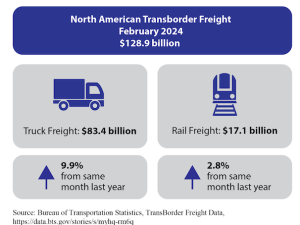Canada’s safety board chief urges U.S. to phase out old rail cars
By: Reuters | Jun 24 2014 at 11:41 AM | Intermodal
The United States should follow the example of Canadian transport regulators with a relatively quick phasing-out of older tank cars that carry volatile crude oil, the head of Canada’s National Transportation Safety Board said on Tuesday.
“If we in Canada can take them out of service in three years, the same can be done here,” TSB Chairwoman Wendy Tadros told rail, pipeline and logistics company executives at an oil-by-rail safety conference in Houston, Texas.
She said it wasn’t enough to encourage voluntary phase-outs of older cars that safety experts deem more susceptible to punctures and leaks in a derailment or crash.
U.S. regulators are considering new rules for tank cars following a series of fiery crude-train crashes and derailments, as oil-by-rail traffic swells in tandem with booming crude production in North America.
Canada’s action came in April after the worst such accident so far - in July last year - when a runaway crude train crashed in a small Quebec town, killing 47 people and leaving half its downtown strip in ruins.
There have been no deaths in subsequent accidents in the U.S.
Specifically, Canada requires that rail cars built before October 2011, when the rail industry adopted a newer tank car design, be phased out by May 2017.
Many shippers have switched to the newer design, which has thicker hulls and reinforced valves. Refiners that receive oil have fleets already comprised of the newer cars, or are phasing out older ones this year.
Still, the newer cars aren’t immune to accidents. A derailment on April 30 of a CSX Corp crude train in Lynchburg, Virginia, involved cars of the newer design.
Stephen Klejst, deputy managing director of the National Transportation Safety Board, the TSB’s counterpart in the U.S., declined to discuss the Lynchburg accident at the conference as the NTSB’s investigation is ongoing.
The NTSB has recommended that crude trains move at slower speeds and bypass urban areas. Klejst said thicker hulls could reduce cracks and tears and mitigate the severity of accidents.
“The energy associated with these accidents, even at 30 miles per hour, is significant,” he said. “As you improve the cars, you can reduce consequences in derailment.”
The TSB and NTSB, which have no enforcement authority, can only make recommendations to improve safety.
Tadros said the accidents were the trigger for sweeping changes that would require political courage by both governments.







